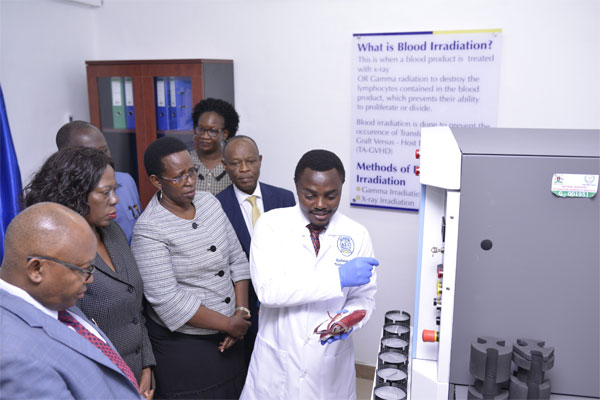
According to Dr. Diana Atwine, the Permanent Secretary in the Ministry of Health, 90% of the people who develop complications resulting from a blood transfusion in Uganda currently die.
In the blood irradiation machine that has been donated to the research center by a California-based laboratory, blood is exposed to low levels of light in a bid to sieve it further to reduce complications that cannot be predicted using the normal screening procedure currently used.
This machine, which is also the first in the East African Region according to Dr Cissy Kityo the JCRC Executive Director was acquired from Sandia National Laboratories in preparation for the bone marrow transplant procedures that are expected to start at the facility in October.
She explains that patients undergoing this procedure usually have their immunity compromised and many times require a blood transfusion. This is why it is important for them to do all that is possible to prevent Transfusion – Associated Graft Versus Host Disease (TA – GVHD).
Even before transplants start, Kityo says this machine has a bigger capacity as it can irradiate six units of blood products every five minutes and a total of 280 blood products per day. For now, she says people who require constant transfusions such as those battling cancer, or sickle cell anemia can take advantage of this service at a fee.
For every unit of blood, they are charging 63,000 Shillings to irradiate it, a fee that may not be affordable to many.
Asked whether this service will be available for all through the public health system, Atwine said such machines are very expensive not just to buy but also to maintain. She says acquiring them would require thorough planning and setting aside enough resources for proper maintenance.
However, Ministry of Health data shows up to 10% of the blood collected by the Uganda Blood Transfusion Services is discarded only after being screened and found positive for infections such as HIV and hepatitis B.
Acquiring technologies like the irradiation machine, experts say, would help save people from complications associated with transfused blood.
 The Independent Uganda: You get the Truth we Pay the Price
The Independent Uganda: You get the Truth we Pay the Price



